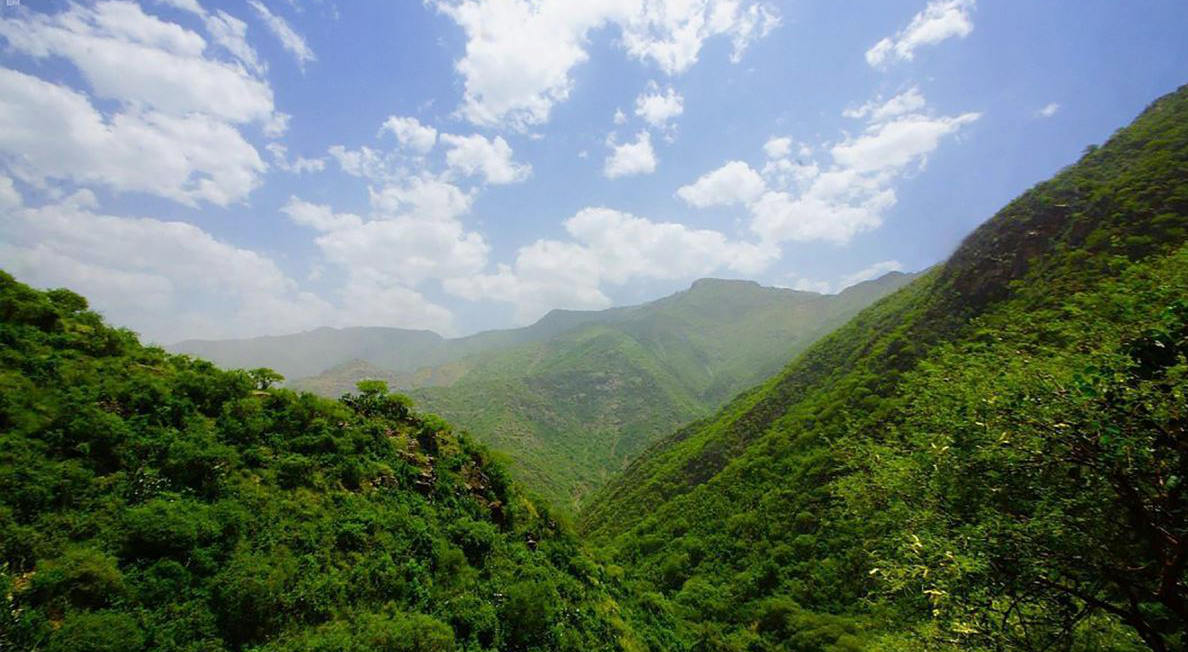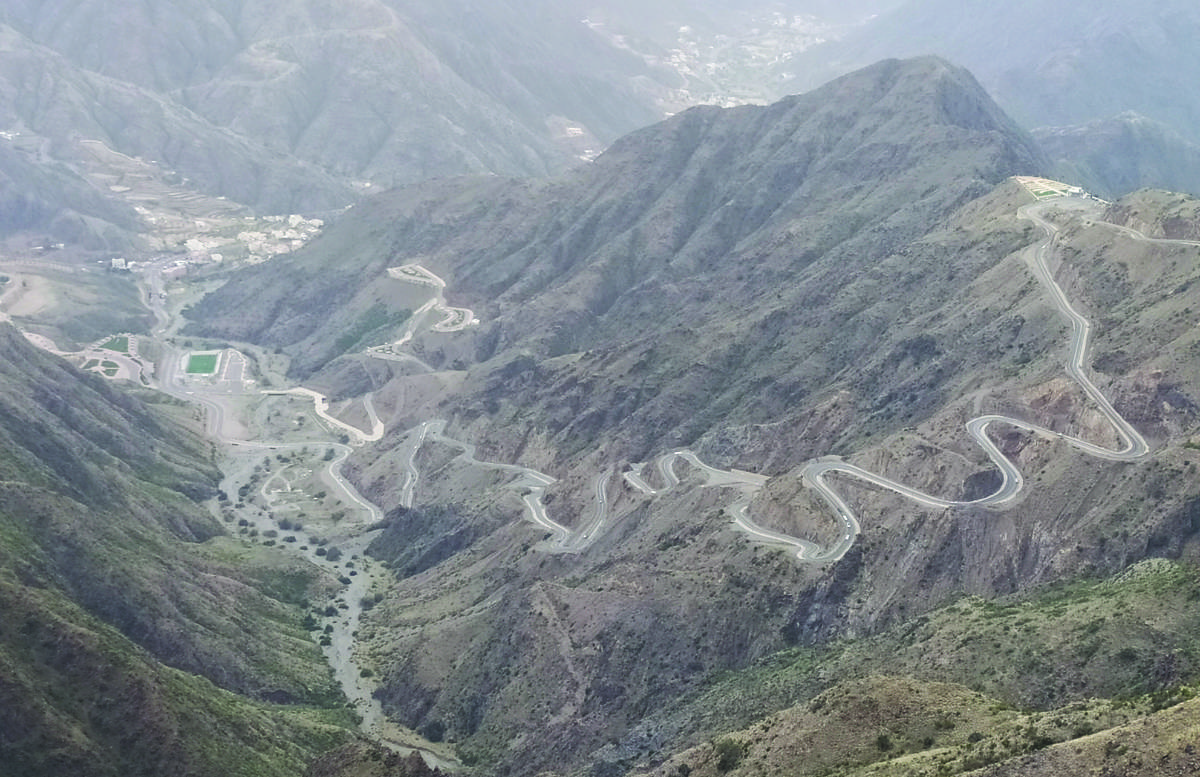JEDDAH: Saudi Arabia is radically expanding its leisure, tourism and hospitality sectors as it opens to international travelers. One attraction in particular could give the tourism industry an ace up its sleeve: The Soudah and “Tahlal” mountains in Rijal Almaa.
Soudah is home to the highest peak in Saudi Arabia, about 3,000 meters above sea level, and has long been popular with locals for its mild year-round temperatures.
Together with its rich history and breathtaking views, this mountainous region has all the makings of a top tourist destination.
The Soudah Development Co. was launched by Crown Prince Mohammed bin Salman, chairman of the Public Investment Fund PIF, to help Soudah and parts of Rijal Almaa in the Asir region grow into a world-class tourist destination.
Soudah and Rijal Almaa boast a combination of geographic, historical and cultural diversity that gives visitors an authentic sense of social connection and cultural immersion, and provide them with a variety of residential and recreational options.
The site of the project was chosen with great care, as it combines all elements of natural beauty historical depth and human values based on Arab and Islamic heritage.
The place drew the attention of Western researchers and scholars for decades, such as the American engineer Karl Twitchell, who was commissioned by Saudi founder King Abdul Aziz to search for water.
The writer Abdullah bin Ali bin Hamid quoted Twitchell describing the beauty of the Soudah mountains and its water sources.
In one of his articles, compiled by his son, the former president of Abha Literary Club, Mohammed bin Abdullah Al-Hamid, into a book titled “Knowledge from Asir,” he pointed out that Jabal Tahlal, which Soudah is part of, was known by several names, including “Jabal Asir,” the “Green Mountain” or “Tawr Al-Ghamam,” all indications of the beauty and heritage of the place in popular memory.
Soudah attracts about 1 million visitors a year, and the SDC hopes to develop a destination that will attract as many as 2 million annually by 2030.
The area is also filled with natural economic resources such as iron. Professor of history at King Khalid University Dr. Ahmed Al-Fayeh pointed out that the inhabitants of the area used to extract minerals used in traditional industries, especially iron and lead, in addition to sulphur compounds used in the manufacture of knives, daggers, janbia and swords.
These areas were also known for pottery and leather industries.
The impressive natural wealth on which modern tourism projects were based includes juniper forests and wild olive trees, as well as hundreds of other trees and shrubs that form one large green space, due to mild summer weather where temperatures do not exceed 20 C with an average annual rainfall of 300 to 500 mm.
The high mountains come together with the dense forests to provide a rare investment and tourism environment, relying on nature’s components while preserving the flora and fauna, namely swallows, turtle doves, and wild pigeons, whose chirping forms a natural melody mixed with burbling water flowing through mountain forests.
The SDC infused SR11 billion ($3 billion) into local infrastructure. Planned developments include 2,700 hotel rooms, 1,300 residential units, and 30 commercial and entertainment attractions.
The project aims to boost the quality of services provided in the project area, by investing in infrastructure development though more than 20 projects worth more than SR3 billion.
Soudah and Rijal Almaa: Where Saudi Arabia’s natural beauty opens up to the world
https://arab.news/zuq3r
Soudah and Rijal Almaa: Where Saudi Arabia’s natural beauty opens up to the world

- Soudah and Rijal Almaa boast a combination of geographic, historical and cultural diversity that gives visitors an authentic sense of social connection and cultural immersion
Laylat Al-Qadr: Worshipers pack Holy Mosques for 27th night of Ramadan

- Makkah’s Grand Mosque received over 4.2 million worshipers on Wednesday night
RIYADH: Millions of Muslims from around the world flocked to the Grand Mosque in Makkah and the Prophet’s Mosque in Madinah for the 27th night of Ramadan, where they performed Taraweeh and Tahajjud prayers.
In a new record, the Grand Mosque received over 4.2 million worshipers on Wednesday night, according to Al-Ekhbariya.
Worshipers were seeking Laylat Al-Qadr (The Night of Power), one of the most important nights in Islam and is, as stated in the Qur’an, better than a thousand months.
Laylat Al-Qadr falls within the final 10 days of Ramadan but its exact date remains unknown, however it’s widely regarded as falling on the 27th of Ramadan. Mislims are also encouraged to seek this night during the odd-numbered nights of the last 10 days.
Operational plans on Wednesday included preparing the Mataf (Area of Circumambulation) to accommodate 107,000 pilgrims per hour, ensuring a smooth movement inside the Grand Mosque.
Authorities have also equipped 428 escalators and 28 elevators and modern audio systems including 1,300 speakers, in addition to providing power sources with a capacity of up to 90,000 tons to cool the Grand Mosque.
The Makkah region Health Affairs Department has boosted its services through medical centers located within the Grand Mosque and its courtyards to provide medical services to pilgrims.
New initiative launched to boost agroforestry in Saudi Arabia

RIYADH: The National Center for Vegetation Cover Development and Combating Desertification has launched the Agroforestry Action Plan Development Project to enhance environmental sustainability, social development and economic growth.
The project assesses agroforestry conditions, applies global best practices and promotes investment for sustainable forest management, the Saudi Press Agency reported.
Aligned with Saudi Arabia’s Vision 2030, it supports environmental sustainability and combats desertification, the SPA added.
As part of the project, the center will activate its December 2024 memorandum with the Center for International Forestry Research and World Agroforestry to enhance research collaboration and implement advanced agroforestry techniques.
The initiative aims to restore land, expand vegetation, protect habitats and reduce carbon emissions. It also fosters resilient forest ecosystems and improves forest areas across the Kingdom.
Additionally, the center is advancing sustainable forests through its initiative to plant 60 million trees, rehabilitating 300,000 hectares by 2030.
Ithra to host three-day Eid Al-Fitr festivities

DHAHRAN: The King Abdulaziz Center for World Culture in Dhahran will host more than 25 Eid Al-Fitr events from March 31 to April 2, featuring exhibitions, performances, and interactive activities.
The program includes an exhibition showcasing eight master artisans in papermaking, calligraphy, and ornamentation. Visitors can explore an installation inspired by mudbrick architecture and traditional palm-based crafts.
At the Children’s Museum, activities include an immersive Eid celebration and workshops such as “Balloon Art,” “Eid in a Bag,” and “The Scent of Eid.”
Families can enjoy the “Eid Wheel” game and storytelling sessions where children create their own cloud keepsake.
Other experiences include “Eid Echoes,” a 360-degree audio journey capturing the festive sounds of Eid, set in the plaza. The library will host Eid-themed storytime.
The “Eid on the Big Screen” program will feature global cinema and Japanese anime, including “The Wind Rises,” “Chibi Maruko-chan,” and “A Mosquito.”
Visitors can also explore an AI-powered interactive display and a vitual reality journey through historical Eid celebrations. Live oud performances will take place in Ithra’s gardens, creating a festive open-air concert.
Lush Garden will offer a vibrant space with games and challenges for families and children to enjoy Eid’s joyful atmosphere. The “Energy Exhibit” will also feature special Eid programming for kids of all ages.
Chad president arrives in Jeddah

The President of Chad Mahamat Idriss Deby Itno was recently received by Prince Saud bin Mishaal bin Abdulaziz, the deputy governor of the Makkah Region, on his arrival at King Abdulaziz International Airport in Jeddah.
The Mayor of Jeddah Saleh Al-Turki, and Ambassador of Chad to the Kingdom Hassan Saleh Al-Qadam Al-Junaidi were among the officials present, the Saudi Press Agency reported.
Smart solutions make life easier for growing pilgrim numbers at Grand Mosque

- The system enables seamless crowd control during peak periods, facilitating smooth entry and exit processes
MAKKAH: The safety, comfort and experience of millions of pilgrims at the Grand Mosque will be better than ever, thanks to the General Authority for the Care of the Two Holy Mosques harnessing advanced technology and improving its strategic oversight.
At the heart of the transformation is a command center which gives the authority a comprehensive overview of operations. Advanced sensors at key entrances track pilgrim numbers in real time, enabling precise crowd monitoring and management in collaboration with relevant authorities.
A camera system captures real-time entry movements, providing instantaneous insights into pilgrim flows and pinpointing potential congestion risks. This dual-system approach has transformed crowd control within the mosque and is particularly effective in critical areas such as the Tawaf and Sa’i routes.
The system enables seamless crowd control during peak periods, facilitating smooth entry and exit processes. By leveraging precise and historical data, it ensures decision-makers can make swift, informed choices.
Over 200 digital panels have also been installed to improve spatial navigation, helping pilgrims move more efficiently through the mosque complex.
The number of electric golf carts has been expanded to 400, as well as custom-designed manual carts being available. This meets the diverse needs of pilgrims during the season, ensuring comfortable and seamless transportation that simplifies the performance of religious rituals.
A huge cooling infrastructure spans the sacred space, utilizing 155,000 tonnes of refrigeration to maintain perfect ambient temperatures across the Grand Mosque. Balanced lighting illuminates every corner, while a precision audio system ensures that calls to prayer and religious services resonate with clarity. A new luggage storage service also offers secure, QR-coded smart tags for easy tracking and retrieval of belongings.
The authority maintains rigorous standards and conducts periodic updates as part of efforts to maintain service efficiency and accommodate the growing number of pilgrims.






















